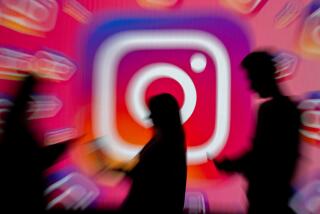Q&A: ‘Twee’ author Marc Spitz on his nod to a subculture gone too far
The subtitle of “Twee” (It Books: 354 pp, $16.99 paper), Marc Spitz’s new cultural history, says it all: “The Gentle Revolution in Music, Books, Television, Fashion, and Film.” How we so “gently” arrived here, however, needs an explanation. In Spitz’s estimation, all roads lead to Walt Disney, creator of a moviemaking empire (entire fantasy worlds, really) built around sentimental characters and a whimsical “it’s a small world after all” perspective — one that some people, to this day, vociferously love or hate.
In his introduction, Spitz rattles off a list of influences that, he feels, define what the British press for years has labeled “twee,” a pejorative term that once referred to quaint, art-rock, indie-pop bands but has now come to mean something more wide-ranging. The list includes contemporary figures such as Stuart Murdoch of the band Belle & Sebastian, director Wes Anderson, author-publisher Dave Eggers and writer-filmmaker Miranda July, as well as predecessors that include J.D. Salinger, Edward Gorey, Jean-Luc Godard and the Velvet Underground.
The book is less a serious interrogation than a comical and affectionate tribute — a wink and a nod to a subculture gone too far, one that is as easy to parody as it is to identify on the street.
The author of biographies of David Bowie and Mick Jagger, two novels and an oral history of L.A. punk, among other books, Spitz counts himself as a devotee of the twee aesthetic. But that wasn’t readily apparent in the book — I couldn’t get a true sense of this until he talked to me by phone from his apartment in the West Village.
What compelled you to write this book?
I wrote a memoir (“Poseur: A Memoir of Downtown New York City in the ‘90s”) the year before. I had turned 40, closed the door, and locked it. It felt like a week, but apparently I spent a year going through every journal, every backstage pass, every reporter’s note on hotel stationery, every diary — and it was the diaries that led me to “Twee.”
I would make these long playlists of full albums to play while I was writing the memoir. Then I just started seeing all these contemporary parallels, left and right, to what was called “twee” by the British press — it was then a disparaging term for a band that was fronted, usually, by a woman with a Jean Seberg haircut and a bunch of guys with fringes and big guitars they couldn’t carry.
I didn’t really put the book idea together until I had a conversation with my agent. He said, “Do you have any ideas for anything?” ... The first thing that came out of my mouth was twee. And it just so happened that this was the year the Zooey Deschanel show premiered, and Lena Dunham was getting all this attention, and when Vanity Fair’s website — which I was contributing to at the time — would review it or recap things, and say “tweepulsive” or “adorkable.” I also knew because I’m a rock writer that music had changed. ... There were all these bands who were trying to be less jaded rather than more jaded. They wore sweaters, like Vampire Weekend, and they seemed like characters out of Salinger.
Then “Portlandia” started making fun of it, and they didn’t need to wink too hard.
I can’t exactly tell if you consider yourself twee.
I think it’s fair to say that I am, but I’ve been a reporter for 17 years as well. So the fan-boy twee person writing the book was the recessive gene, and I had to keep it that way. My editor had to keep a watch on that as well or I would just fill the book with twice as many references to Morrissey. It was an asset, and I wanted to keep it an asset and not a liability that I had — almost like when they preload software into a computer — all this knowledge already loaded into my head. Whether it was Salinger or “Peanuts.”
You interviewed a lot of people. Was it hard to get them to talk?
I wrote a careful letter before I approached anyone. I said to my editor, “No one is going to talk to me if I’m like ‘Hey, I’m writing this book that is going to reduce every individual piece of art you’ve released into this world into something that people hate. Will you talk to me?’” It’s polarizing.
In the book you argue that twee is more of a “tribe” of people than a specific generation.
I think it’s like punk and, to an extent, hip-hop. It’s a mega-movement, which means it has multiple heads. You have teenagers who were born after Kurt Cobain killed himself mourning him. You have people like Tavi Gevinson [of Rookie online magazine], who is fluent in the films of Hal Ashby, even though she’s a teen. We all sort of share this communal twee record collection. We all know what belongs in it and what doesn’t. I wanted to call it Generation Twee because that’s catchier and would probably sell more books, but in good conscience I couldn’t because it wasn’t one generation.
Was there a tipping point?
It was strange to see Zooey Deschanel on the side of a bus. I think that might have been the tipping point, and to have things debated, whether it’s on Jezebel or Vulture or VF Daily, about what is essentially, at heart, an artisanal, quiet, private bedroom movement. It’s jarring. I don’t know. I would hate to look back at the book in a year’s time and think, “Oh, sorry. I jumped the gun. It wasn’t a thing after all.”
Morrissey is the king of this twee movement, is he not?
I think he’s the king of everything.
Gabel is a writer and book editor living in Los Angeles. He is also the editor and associate publisher of the Pitchfork Review.
More to Read
Sign up for our Book Club newsletter
Get the latest news, events and more from the Los Angeles Times Book Club, and help us get L.A. reading and talking.
You may occasionally receive promotional content from the Los Angeles Times.






